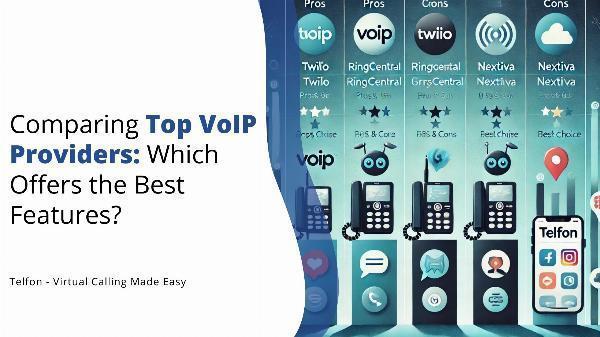How Virtual Phone Systems Can Enhance Remote Work Efficiency

In today's rapidly evolving business landscape, remote work has transitioned from a temporary solution to a permanent fixture for many organizations. As remote teams become more common, businesses are seeking ways to optimize communication and streamline operations. Virtual phone systems are emerging as a crucial tool in enhancing remote work efficiency.
What Are Virtual Phone Systems?
Virtual phone systems are cloud-based solutions that provide telephony services over the internet. Unlike traditional phone systems that rely on physical infrastructure, virtual phone systems use VoIP (Voice over Internet Protocol) technology to manage calls. These systems offer a range of features including call forwarding, voicemail, auto-attendants, and integration with other communication tools. Their flexibility and scalability make them ideal for businesses with remote workforces.
Benefits of Virtual Phone Systems for Remote Work
1. Seamless Communication
One of the primary advantages of virtual phone systems is their ability to facilitate seamless communication. With features like VoIP, remote workers can make and receive calls from their computers or mobile devices. This ensures that team members can stay connected regardless of their physical location, maintaining the flow of communication and preventing disruptions in workflow.
2. Unified Communication Channels
Virtual phone systems integrate with various communication tools, providing a unified communication platform. This integration includes features such as video conferencing, instant messaging, and email, all accessible through a single interface. This unified approach eliminates the need for multiple applications, streamlining communication and collaboration for remote teams.
3. Flexible Call Management
Managing calls efficiently is crucial for remote work. Virtual phone systems offer advanced call management features such as call forwarding, voicemail-to-email, and call routing. These features ensure that calls are directed to the appropriate person or department, regardless of where employees are located. This flexibility helps in managing call volumes and reduces the likelihood of missed calls.
4. Enhanced Professionalism
Maintaining a professional image is essential, even for remote businesses. Virtual phone systems support this by offering features like custom call greetings, auto-attendants, and call queuing. These features create a polished experience for clients and customers, ensuring that remote teams present a cohesive and professional front.
5. Scalability and Cost-Effectiveness
Virtual phone systems are highly scalable, making them perfect for businesses that experience fluctuating needs. Whether expanding or downsizing, virtual phone systems can easily accommodate changes without the need for significant hardware investments. Additionally, these systems are cost-effective compared to traditional phone setups, as they do not require extensive physical infrastructure.
6. Access to Advanced Analytics
Analytics are vital for measuring and improving performance. Many virtual phone systems come equipped with built-in analytics tools that track call volumes, durations, and employee performance. These insights help managers monitor productivity, identify trends, and make data-driven decisions to enhance overall efficiency.
7. Integration with CRM Systems
Integrating virtual phone systems with Customer Relationship Management (CRM) systems enhances customer interactions. Remote workers can access customer information, track communication history, and manage follow-ups directly through the CRM interface. This integration ensures that customer service remains consistent and high-quality, even with a dispersed team.
8. Secure Communication
Security is a top concern for remote work. Virtual phone systems often include encryption and other security features to protect sensitive information. By securing calls and data transmissions, these systems ensure that remote communications are confidential and compliant with industry regulations.
9. Improved Collaboration
Effective collaboration is crucial for remote teams. Virtual phone systems enhance collaboration through features like conference calling and team messaging. These tools enable team members to conduct meetings, share information, and work together on projects regardless of their geographical location.
10. Ease of Use and Accessibility
Virtual phone systems are designed to be user-friendly, with intuitive interfaces that simplify setup and operation. Remote workers can easily adapt to these systems, focusing on their tasks rather than struggling with complex technology. This ease of use contributes to a more efficient and productive work environment.
How to Choose the Right Virtual Phone System
Selecting the right virtual phone system is crucial for maximizing its benefits. Consider the following factors when choosing a system:
Features and Functionality: Ensure the system offers the features you need, such as call forwarding, voicemail-to-email, and integration with other tools.
Scalability: Choose a system that can grow with your business, allowing for easy upgrades and expansions.
Cost: Compare pricing plans to find a system that fits your budget while providing the necessary features.
Customer Support: Opt for a provider with reliable customer support to assist with any issues or questions.
Security: Verify that the system offers robust security measures to protect sensitive information.
Conclusion
Virtual phone systems have become a game-changer for businesses embracing remote work. By offering seamless communication, unified channels, flexible call management, and enhanced professionalism, these systems address the unique challenges of a remote workforce. Their scalability, cost-effectiveness, and advanced features make them an invaluable tool for improving efficiency and maintaining a high level of service. As remote work continues to evolve, investing in a robust virtual phone system can significantly impact your business’s productivity and success.
Incorporating these insights into your business strategy can help you leverage the full potential of virtual phone systems, ensuring a more connected, efficient, and professional remote work environment.
Note: IndiBlogHub features both user-submitted and editorial content. We do not verify third-party contributions. Read our Disclaimer and Privacy Policyfor details.






